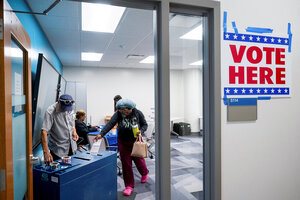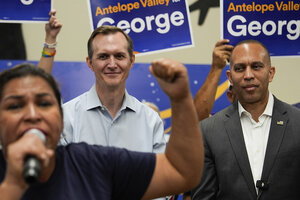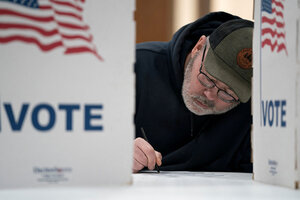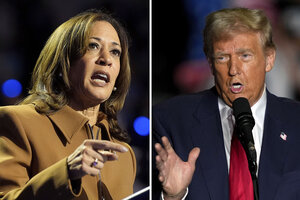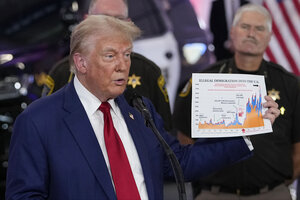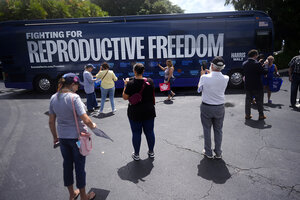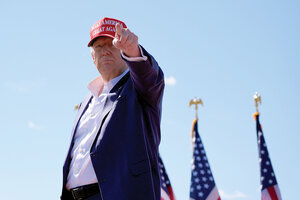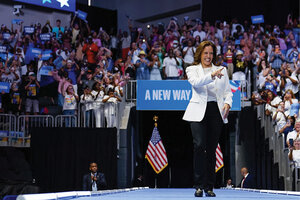As Harris picks Walz, George Floyd riots resurface as election issue
Loading...
When Vice President Kamala Harris, the 2024 Democratic presidential nominee, announced Minnesota Gov. Tim Walz as her running mate Tuesday, it energized many Democrats for the 13-week Election Day sprint that lies ahead. Many Republicans, however, seemed equally eager to look backward – to two weeks in 2020.
Black Minneapolis area resident George Floyd was killed by a police officer on May 25 of that year. Black Lives Matter protests soon rippled out to thousands of cities and towns across the country. A small share of the protests was accompanied by violence, which caused over a billion dollars in damage and prompted a record number of National Guard deployments.
Perhaps nowhere in America felt the reverberations of the murder as acutely as the epicenter of Minneapolis.
Why We Wrote This
Keeping the peace is one of the most vital jobs a public executive has. Republican attacks against Harris running mate Tim Walz could put questions of law, order, and the George Floyd protests at the campaign forefront.
What really happened during the George Floyd protests?
Mr. Walz was among Democratic officials facing acute criticism for their responses to the violence, himself calling the early local response “an abject failure.” He faced immediate backlash for waiting three days after Mr. Floyd’s murder to sign an executive order activating the largest domestic deployment of Minnesota National Guard since World War II.
The full story of Governor Walz’s response to Mr. Floyd’s death is more nuanced. In the years that followed, Mr. Walz signed bipartisan legislation on police reforms and offered state support for other public safety measures. And details around the state’s delayed National Guard deployment are still disputed. State officials say they weren’t given the necessary information from the city, while Minneapolis Mayor Jacob Frey, who reportedly asked for assistance from the governor 24 hours prior to when the Guard was activated, says the governor hesitated.
What appears clear is that his initial response to the rioting will likely be a focal point of election-year debate.
Republicans were quick to resurface this criticism Tuesday, tweeting photos of buildings ablaze and blaming Mr. Walz for the rioting and looting. Minneapolis was “ground zero for the BLM riots of 2020,” Florida Gov. Ron DeSantis posted on X. “Harris egged it on and Walz sat by and let Minneapolis burn.” Republican vice presidential candidate JD Vance similarly referenced Mr. Walz’s role in violence of the summer of 2020 when asked about his Democratic opponent.
Floyd protests: A winning issue for Republicans?
By choosing Mr. Walz as her running mate, Ms. Harris has opened the door for Republicans to relitigate the issue of “law and order,” one of the most defining themes of the last presidential election – potentially tilting the campaigns’ focus to terrain that favors the GOP.
“In politics you try to inflate everything, and they are going to try to inflate Walz’ role more than he deserves,” says Vin Weber, a Republican strategist and former Minnesota congressman. “But he didn’t do what he could have done.”
Mr. Weber says Republicans’ messaging on the topic could hurt Democrats.
“If it was a phony issue, I’d say they should pass it by quickly. But it’s not a phony issue,” he adds. “It’s a legitimate line of attack.”
Despite Republican voters listing violent crime as a more important issue than abortion, guns, or immigration in 2020, and despite former President Donald Trump’s efforts to win back suburban voters by promising to protect their communities, Mr. Trump and the Republicans lost the presidency and Senate seats. But downballot Republican candidates outperformed expectations, specifically in the U.S. House and Republican-leaning suburbs.
Democrats and defunding the police
For Democrats, more concerning than Republicans’ strength on the safety issue is the potential for a law-and-order conversation to reignite a division within their own party. Some progressive Democrats responded to the 2020 events in Minneapolis with efforts to “defund the police” – which proved to be a losing message in subsequent elections. Look no further than Minneapolis, where voters rejected a 2021 ballot measure to replace the city’s police department with a “public-health oriented” unit.
The Democratic Party quickly moderated itself, with President Joe Biden making a point of saying the answer to rising crime was to “fund the police” in his 2022 State of the Union address.
"I do know how the mayor’s office works, and I know that Tim Walz is not supposed to be the first responder in the city,” says former Minneapolis Mayor R.T. Rybak. “And Tim Walz played a very active role when it was right for the governor to do [that] and then was incredibly important in helping the rebuilding process, you know, to get all these stores and businesses back up and running” with state aid.
“The governor responded effectively and quickly with [the] National Guard and worked with local authorities to do it,” says Keith Ellison, Minnesota’s Democratic attorney general.
It was former Minneapolis Police Officer Derek Chauvin – not the governor – who knelt on Mr. Floyd’s neck for almost 10 minutes and who caused the “civil disturbances” that followed in Minneapolis, says Mr. Ellison. As the first Black official elected statewide in Minnesota, Mr. Ellison credits Mr. Walz for handing him the case to prosecute Mr. Chauvin and the other officers.
“His decision helped quell civil unrest,” Mr. Ellison says.
Walz signed bipartisan public safety laws
The divided Minnesota legislature passed two police accountability bills in less than two years following Mr. Floyd’s death, both of which were signed into law by Mr. Walz.
The package from July 2020 bans neck restraints and chokeholds and provides more police training.
The following June, following Mr. Chauvin’s conviction, the legislature passed a bill to limit no-knock warrants. Mr. Walz also signed executive orders for community violence prevention grants and to allow families to see police body cam footage after a loved one is killed. In late 2023, Mr. Walz approved a $300 million disbursement to public safety departments across Minnesota.
Reviews have criticized Walz’s response
But just as Democrats can point to these bipartisan achievements if policing and crime rises again to the political forefront, Republicans will likely reference a 2020 report from Minnesota Senate Republicans in which the adjutant general of the Minnesota National Guard, now the National Guard director, said that some of the rioting and destruction could have been avoided if Mr. Walz, commander in chief of the Minnesota National Guard, had acted sooner. According to testimony from Senate hearings, the Minnesota National Guard was “waiting for orders” outside Minneapolis as the city’s 3rd Precinct police building was evacuated and set on fire by vandals.
Republicans may also reference an external review of the state’s response published in 2022, which found “timeliness of Minnesota National Guard deployment” as an area to be improved.
“He sat on his hands for three days while Minneapolis burned,” says Jim Schultz, a Republican who ran against incumbent Mr. Ellison for Minnesota attorney general in 2022 promising to fight post-2020 crime.
“Downtown Minneapolis is still a ghost town after what happened,” says Mr. Schultz, noting that four years later, the rebuilding of Lake Street is still underway. “The scars of 2020 continue to be felt.”
****
More of our 2024 election coverage
In Pennsylvania, ordinary citizens combat political violence
Before the attempt on former President Donald Trump’s life, there had been rising incidents of harassment and threats of violence against public officials. Here’s how some people are working to dampen the risks.
Joe Biden’s legacy rests with Kamala Harris. Can he help her win?
For the next 100 days, a sensitive issue for the Harris campaign and the White House is: Where and when should Joe Biden be seen? It matters not just for the election, but also for his own legacy.
Six issues Kamala Harris is campaigning on – and 5 she’d rather avoid
Kamala Harris has the opportunity to rebrand herself in the eyes of voters. Her focus will include protecting abortion rights – and drawing a contrast with Donald Trump on justice.
New GOP platform reflects Trump’s dramatic reshaping of the party
A party platform, while not binding, gives an indication of policy priorities and a road map for governing. Republican changes since 2016 reflect a populist shift, dialing back long-standing party stances on abortion, guns, and fiscal responsibility.
Trump guilty verdict marks first-ever criminal conviction for a former president
A felony conviction does not preclude Donald Trump from running for or serving again as president. But it promises to scramble an already fraught campaign season, even as other criminal lawsuits against the former president are postponed.











